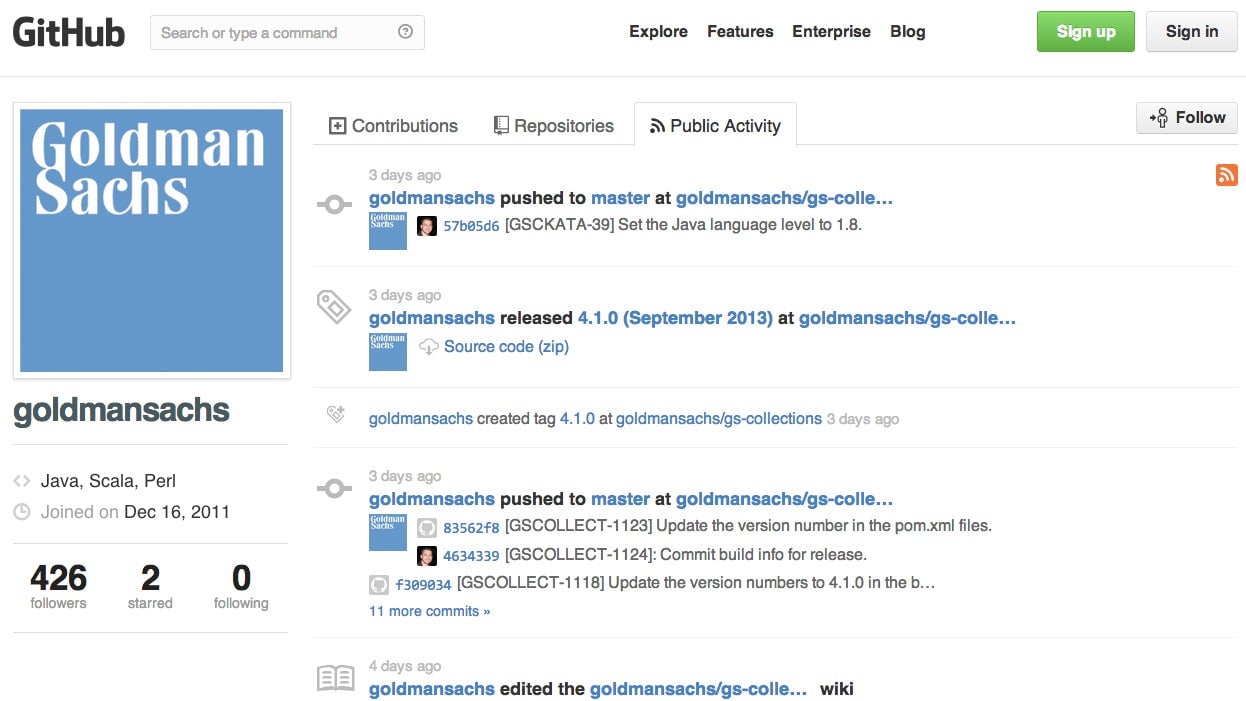Goldman Sachs has a problematic plan to keep its tech talent around
Believe it or not, Goldman Sachs is on Github. For all you non-programmers out there, Github is a platform that allows developers to write software online and, frequently, to share it with others. For banks—which have typically kept technology behind closed doors—that’s an alien concept. And for Goldman, being on Github is even stranger.

Believe it or not, Goldman Sachs is on Github. For all you non-programmers out there, Github is a platform that allows developers to write software online and, frequently, to share it with others. For banks—which have typically kept technology behind closed doors—that’s an alien concept. And for Goldman, being on Github is even stranger.
In 2009, Goldman programmer Serge Aleynikov was arrested by the FBI and convicted of stealing proprietary Goldman Sach software (he is currently free on appeal). Aleynikov argued that the code he took was primarily open-source, along with bits of proprietary Goldman Sachs code that he kept for documentation purposes. As described in a Vanity Fair article about Aleynikov’s case, Goldman’s stance toward the open source world was anything but friendly:
Serge quickly discovered, to his surprise, that Goldman had a one-way relationship with open source. They took huge amounts of free software off the Web, but they did not return it after he had modified it, even when his modifications were very slight and of general rather than financial use. … Open source was an idea that depended on collaboration and sharing, and Serge had a long history of contributing to it. He didn’t fully understand how Goldman could think it was O.K. to benefit so greatly from the work of others and then behave so selfishly toward them.
Evidently, that thinking has changed in the last year and a half. Goldman’s technologists have been touting something called GS Collections, a collection of libraries to aid Java programmers in coding, which they’ve opened up to the world on Github. The software is designed to help businesses building software applications; through Github, outside coders can play with the software and contribute their own improvements.
Playing up its open-source credentials is also one way the firm plans to draw tech talent. The bank has found itself competing for new recruits with the likes of Google and Facebook, which embrace the open source ethic embodied by Github. And convincing employees that they’re a part of something bigger could make it more palatable to join an industry that arguably caused the last global meltdown.
“We use open source software in many of our operations,” Mike Marzo, a tech fellow at Goldman, told an audience of Java programmers last week. “We have benefited from the work of others and we’d like to give something back.”
This effort only goes so far. Goldman Sachs isn’t willing to share its trading technology or any other software it considers proprietary. Goldman Sachs also has private systems meant to foster greater collaboration between its own programmers, but the fruits of that collaboration will stay strictly within the firm.